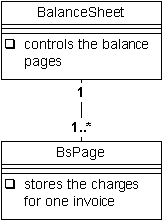
Balance sheets and pagesThe class BalanceSheet shows the current financial status of a contract. The concept of the class is much the same as hotels usually handle the account status for their guests:
For the hotel administration this system has yet another advantage: The current open balance can be easily retrieved and compared to the guest's credit worthiness. |
In OSB the concept is extended: The balance sheet does provides access to all charges of a contract. It consists of a balance page that stores all information relevant for a billing period and the related invoice.This includes charges debited in advance, but may as well include the available free minutes.

Once a contract is activated a balance sheet exists throughout its lifecycle. BalanceSheet contains and controls several BsPage each of them storing the charges for one invoice.
This design covers the following topics:
| What follows below is the original design which was later replaced by
balance pages. Though there were a lots of changes during the implementation of the library, the original concepts are still valid. |
OSB maintains exactly one open balance sheet for each contract, except of course for deactivated contracts after the final invoice. If an application closes a balance sheet the class itself will automatically open a new balance sheet if necessary. Similarly, the class will also create a new balance sheet automatically whenever charges for a contract, that currently does not have an open balance sheet, are risen (the exact criteria are explained in the section First and last invoice for a contract).
| Design considerations: Forwarding of unbilled charges to next balance sheet |
|---|
|
The balance sheet contains unbilled data since contract was last billed.
OSB normally will not bill upto the current date and time, but rather
will define the end date of the period to bill some days in the past. |
|
Let's summarize again what we want to achieve:
Basically there are two different solutions how to fulfill the requirements above:
|
| The current implementation follows approach 1. It is however not possible to change the billing period of a balance page. |
In the database data of BalanceSheet
are stored in a collection of tables, all (logically) referring to
the master table BALANCESHEET. This table determines the if the
charges related are already billed or not. A contract's balance
sheet may be updated only if the appropriate row in the master
table is locked.
The diagram below shows how the billing application uses the balance sheet of a contract: In contrast to other applications, billing usually processes the whole balance sheet, closes the balance sheet after the creation of the invoice and creates the new balance sheet for the contract just billed. Other actors, e.g. customer administration, only browse the balance sheets and may add single charges.
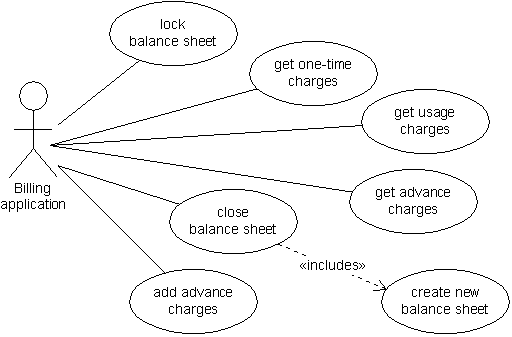
When the billing application starts invoicing a contract it first locks the balance sheet. This prevents any other application from modifying data that most probably will become obsolete within a short time. During the invoice generation for a contract, billing retrieves information on advance charges and reads usage- and one-time charges. After the invoice is created the application closes the current balance sheet (the one just worked out) and writes information for the next billing period (e.g. advance charges) to the newly opened balance sheet.
Billing creates invoices for contracts which have an open balance sheet that fulfills the criteria of the billcycle assigned to the contract (e.g., has been opened more than one month ago). If there exists no open balance sheet, then the billing engine does not process the contract, thus no subscription charges are calculated and no invoice is created at all.
In other words, this means that as long as the contract is active, there must be an accompanying open balance sheet for the contract and its owner so that the billing application can regularly invoice subscription fees and other charges.
In line with this logic, the first invoice for a contract is created as soon as the open balance sheet fulfills the criteria of the billcycle being processed. This requires that activation of a contract implies opening the first balance sheet, so that billing can charge subscription right from the activation date, even if there are no other charges to be billed for the contract.
Subsequent balance sheets will be opened by the library, whenever the currently open balance sheet is closed. No new balance sheet is opened if the contract was deactivated before the close date of the current balance sheet and there are no charges present for the contract after this date. The field BALANCE_SHEET.LAST_ASSIGNED shows when the last billing relevant modification was made to the balance sheet and the library updates this field whenever new charges are added to a balance sheet.
Even after a contract has been deactivated and its last invoice was created, further charges may incur. This can happen, e.g., when delayed roaming records arrive at the operator's site. In such a case, if no open balance sheet exists, the library must open one so that it can assign the charge to it.
Options for IntervalBillcycle: Create first invoice when the open balance sheet is first seen, independent of the interval. If the contract is deactivated, invoice all available charges, even if they are assigned to the balance sheet after the current billing interval.
Option for both billcycle types: Indicate first and last invoice in ToBill. By definition, the last invoice is one whose billing interval contains the contract deactivation date.
| + ToDo: Should status changes also cause a change of LAST_ASSIGNED? + ToDo billing: all ToBill structures for the same contract must be processed by the same thread |
Some typical use cases of the balance sheet for a customer care operator are shown in diagram
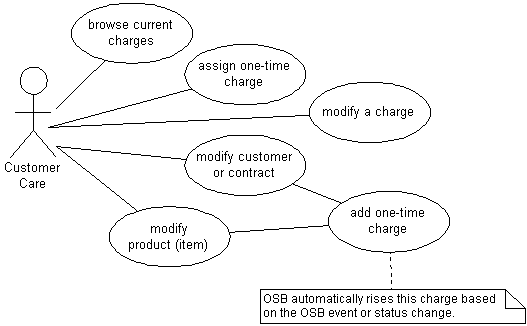
A customer care user should be able to browse and preview the current charges for a contract. For some services provided to a customer he can manually rise a one-time charge, or he modifies the amount of disputed charged. If the customer or the contract changes OSB may rise an event, similar if a personalized product or product item is modified. In both cases OSB checks if the event is chargeable and eventually adds the charge to the current balance sheet.
For rating there is only one use case related to the balance sheet:
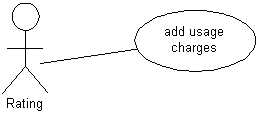
After rating has processed the incoming call records, the rated UsageRecord must be added to the balance sheet of each contract. This may sound trivial at a first glance but there are consequences from that:
Diagram shows other potential usage of balance sheets. The usage cases described here are different: For their realization there shouldn't be a need to read and process the individual charges.
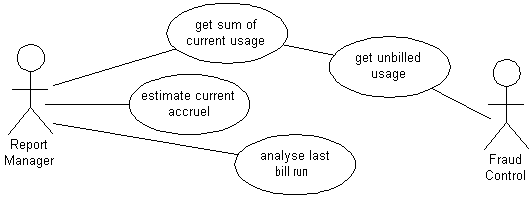
The master table BALANCESHEET should store all "management relevant" information, i.e., sum up the the single charges by reasonable groups: Usage, one-time and subscription charges. Usage charges could be divided into a few groups, e.g., national, international and roaming calls.
Public members of the class BalanceSheet are shown in diagram
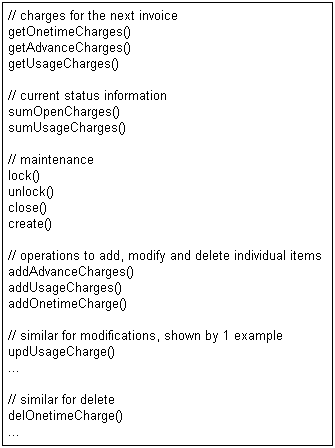
In the database the class BalanceSheet is stored in a collection of tables shown in diagram I think the table names are self explanatory, for detailed information please refer to the table definitions below.
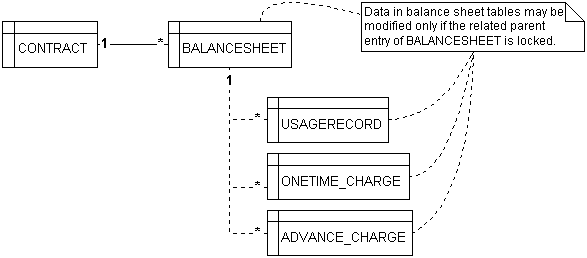
In diagram the relation between BALANCESHEET and the three data tables USAGERECORD, ONETIME_CHARGE and ADVANCE_CHARGE is shown as a dependency only: The charges are not directly assigned to a balance sheet. If we want to know to which balance sheet a charge belongs, we must use <CHARGE>.ASSIGNED with BALANCESHEET.OPENED and BALANCESHEET.CLOSED.
The OWNER_ID is stored at the balance sheet to facilitate
determining balance-sheets (contracts) to be billed for a billcycle
(see billcycle). With the current logic, a contract transfer means
that the CONTRACT.OWNER_ID and BALANCE_SHEET.OWNER_ID change. The
next bill will therefore be for the new owner.
![]() This basic contract transfer
logic can be extended by duplicating the open balance sheet when a contract
transfer takes place. After the transfer, there would be two open balance sheets
for the same contract; one for the old and one for the new owner. The OPENED
date of the new open balance sheet defines the start of the billing period for
the first invoice for the new owner. The same date must be stored at the balancesheet
of the old owner (in a new field, not in CLOSED). It indicates the end date
of the billing period for the old owner and that this invoice is his last invoice
(advance charges). It will be good - if not technically necessary anyway - to
keep the history of other relevant data (contract) in case of changes such as
a contract transfer.
This basic contract transfer
logic can be extended by duplicating the open balance sheet when a contract
transfer takes place. After the transfer, there would be two open balance sheets
for the same contract; one for the old and one for the new owner. The OPENED
date of the new open balance sheet defines the start of the billing period for
the first invoice for the new owner. The same date must be stored at the balancesheet
of the old owner (in a new field, not in CLOSED). It indicates the end date
of the billing period for the old owner and that this invoice is his last invoice
(advance charges). It will be good - if not technically necessary anyway - to
keep the history of other relevant data (contract) in case of changes such as
a contract transfer.
The table BALANCESHEET is the master of all tables that store balance sheet related data. By this we mean that
Except in special situations, that yet have to be determined, charges that are related to a closed balance sheet must not be modified: I can not see a reason why this should be needed, but there are two very good reasons for not allowing it: Firstly OSB relies on the balance sheet data for re-billing (see requirements), and secondly somebody must update all related data accordingly.
| BALANCESHEET | master table for information about unbilled and billed charges | |
|---|---|---|
| identification | ||
| BALANCESHEET_ID | integer not null | unique id of balance sheet (PK) |
| CONTRACT_ID | integer not null | contract of the balance sheet |
| OWNER_ID | integer not null | the associate id who owns the balance sheet |
| BILLCYCLE_ID | integer not null | billcycle identifier |
| summary statements | ||
| USAGE_CHARGES | number | total usage charges |
| ONETIME_CHARGES | number | sum of one-time charges |
| ADVANCE_CHARGES | number | sum of advance subscription debits |
| administration | ||
| OPENED | date not null | timestamp when balance sheet was opened |
| CLOSED | date | timestamp when balance sheet was closed (billed), NULL indicates the current balance sheet of a contract. |
| LAST_ASSIGNED | date | timestamp when the last billing relevant modification was made |
| ONETIME_CHARGE | onetime charges | |
|---|---|---|
| identification | ||
| ONETIME_CHARGE_ID | integer not null | unique identifier (PK) |
| CONTRACT_ID | integer not null | charged contract |
| PERSONALIZED_PRODUCT_ID | integer not null | charged personalized product: allows to identify the product user |
| PRODUCT_PART | integer | charged product part |
| STATUS_ID | integer | identifier of status change |
| ... | ... | <other info to identify the origin of the charge> |
| charge definition | ||
| CURRENCY | currency | currency charged |
| AMOUNT | number | amount charged |
| CHARGE_TRAITS_ID | integer not null | traits of charge |
| REMARK | varchar2 | remark for manually assigned charges |
| administration | ||
| ASSIGNED | date not null | timestamp when charge was risen |
| ADVANCE_CHARGE | invoiced advance charges | |
|---|---|---|
| identification | ||
| ADVANCE_CHARGE_ID | integer not null | unique identifier (PK) |
| CONTRACT_ID | integer not null | charged contract |
| PERSONALIZED_PRODUCT_ID | integer not null | charged personalized product: allows to identify the product user |
| PRODUCT_PART | integer | charged product part |
| charge definition | ||
| CURRENCY | currency | currency charged |
| AMOUNT | number | amount charged |
| CHARGE_TRAITS_ID | integer not null | traits of charge |
| FROM | date not null | start of charged period (inclusive) |
| UP_TO | date | end of charged period (not inclusive) |
| administration | ||
| ASSIGNED | date not null | timestamp when charge was invoiced |